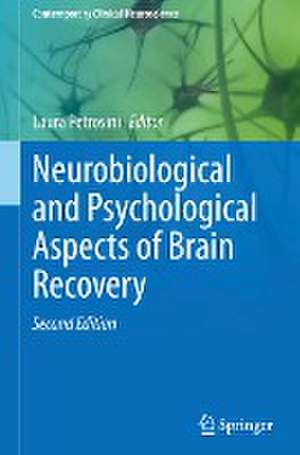Neurobiological and Psychological Aspects of Brain Recovery: Contemporary Clinical Neuroscience
Editat de Laura Petrosinien Limba Engleză Hardback – 7 iun 2023
| Toate formatele și edițiile | Preț | Express |
|---|---|---|
| Paperback (2) | 1045.73 lei 39-44 zile | |
| Springer International Publishing – 7 iun 2024 | 1045.73 lei 39-44 zile | |
| Springer International Publishing – 18 iul 2018 | 1109.29 lei 6-8 săpt. | |
| Hardback (1) | 1229.40 lei 6-8 săpt. | |
| Springer International Publishing – 7 iun 2023 | 1229.40 lei 6-8 săpt. |
Din seria Contemporary Clinical Neuroscience
- 5%
 Preț: 655.42 lei
Preț: 655.42 lei - 18%
 Preț: 958.25 lei
Preț: 958.25 lei - 18%
 Preț: 1678.01 lei
Preț: 1678.01 lei - 18%
 Preț: 1403.22 lei
Preț: 1403.22 lei - 18%
 Preț: 1008.43 lei
Preț: 1008.43 lei - 5%
 Preț: 1407.87 lei
Preț: 1407.87 lei - 18%
 Preț: 1101.40 lei
Preț: 1101.40 lei - 18%
 Preț: 944.19 lei
Preț: 944.19 lei - 18%
 Preț: 1231.01 lei
Preț: 1231.01 lei - 5%
 Preț: 1105.95 lei
Preț: 1105.95 lei - 15%
 Preț: 644.30 lei
Preț: 644.30 lei - 5%
 Preț: 1173.82 lei
Preț: 1173.82 lei - 15%
 Preț: 641.03 lei
Preț: 641.03 lei - 18%
 Preț: 1239.19 lei
Preț: 1239.19 lei - 18%
 Preț: 1110.24 lei
Preț: 1110.24 lei - 18%
 Preț: 1113.39 lei
Preț: 1113.39 lei - 18%
 Preț: 1225.94 lei
Preț: 1225.94 lei - 5%
 Preț: 1438.58 lei
Preț: 1438.58 lei - 15%
 Preț: 651.84 lei
Preț: 651.84 lei - 5%
 Preț: 1103.22 lei
Preț: 1103.22 lei - 18%
 Preț: 1402.55 lei
Preț: 1402.55 lei - 5%
 Preț: 1089.48 lei
Preț: 1089.48 lei - 18%
 Preț: 1828.60 lei
Preț: 1828.60 lei - 5%
 Preț: 1103.75 lei
Preț: 1103.75 lei - 18%
 Preț: 1407.46 lei
Preț: 1407.46 lei - 18%
 Preț: 951.47 lei
Preț: 951.47 lei - 18%
 Preț: 1385.37 lei
Preț: 1385.37 lei
Preț: 1229.40 lei
Preț vechi: 1499.27 lei
-18% Nou
Puncte Express: 1844
Preț estimativ în valută:
235.31€ • 244.73$ • 197.19£
235.31€ • 244.73$ • 197.19£
Carte tipărită la comandă
Livrare economică 13-27 martie
Preluare comenzi: 021 569.72.76
Specificații
ISBN-13: 9783031249297
ISBN-10: 3031249291
Pagini: 406
Ilustrații: XXIV, 406 p. 1 illus.
Dimensiuni: 155 x 235 mm
Greutate: 0.78 kg
Ediția:Second Edition 2023
Editura: Springer International Publishing
Colecția Springer
Seria Contemporary Clinical Neuroscience
Locul publicării:Cham, Switzerland
ISBN-10: 3031249291
Pagini: 406
Ilustrații: XXIV, 406 p. 1 illus.
Dimensiuni: 155 x 235 mm
Greutate: 0.78 kg
Ediția:Second Edition 2023
Editura: Springer International Publishing
Colecția Springer
Seria Contemporary Clinical Neuroscience
Locul publicării:Cham, Switzerland
Cuprins
Chapter 1: Understanding the Mechanisms of Dendritic Arbor Development: Integrated Experimental and Computational Approaches.- Chapter 2: Autophagy Mechanisms for Brain Recovery. Keep It Clean, Keep It Alive.- Chapter 3: Environmental enrichment and functional plasticity in the hippocampus, an update on the mechanisms involved.- Chapter 4: Translatable Models of Brain and Cognitive Reserve.- Chapter 5: Cognitive Reserve: A Life-Course Perspective.- Chapter 6: Neural Correlates of Brain Reserve: A Neuroimaging Perspective.- Chapter 7: Non-pharmacological Approaches Based on Mind-Body Medicine to Enhancement of Cognitive and Brain Reserve in Humans.- Chapter 8: Roles of Synaptic Plasticity in Functional Recovery After Brain Injury.- Chapter 9: Integrated Methods of Neuromodulation for Guiding Recovery Following Stroke.- Chapter 10: Resilience in Brain Networks After Stroke.- Chapter 11: Epigenetics and brain plasticity:back to function.- Chapter 12: Functional Role of Physical Exercise and Omega-3 Fatty Acids on Depression and Mood Disorders.- Chapter 13: BRAIN RECOVERY IN CHILDHOOD: THE INTERACTION BETWEEN DEVELOPMENTAL PLASTICITY AND REGENERATIVE MECHANISMS.- Chapter 14: Estrogen Neuroprotective Activity After Stroke and Spinal Cord Injury.- Chapter 15: Making Meaning of Acquired Brain Injury: Resources for Functional Recovery.- Chapter 16: An Update on Premorbid Personality Traits and Brain Recovery - Another Aspect of Resilience.- Chapter 17: Psychological Aspects of Recovery After Brain Injury: A Focus on Psychodynamic Factors.- Chapter 18: Artificial Intelligence applications for Traumatic Brain Injury research and clinical management.
Notă biografică
Laura Petrosini, PhD, is Professor Emeritus of Psychophysiology at the University "Sapienza" of Rome and is responsible for the Lab of Experimental and Behavioral Neurophysiology at Santa Lucia Foundation in Rome. Neuronal and psychological approaches to brain functioning are her specific areas of interest.
Textul de pe ultima copertă
The importance of this unique book's approach lies in addressing the impact of neurobiological factors as well as psychological influences on brain recovery following injury. There is growing evidence that emotional, motivational, and cognitive factors along with personality traits play a crucial role in brain plasticity, resilience, and recovery. Topics include synaptic and neuronal plasticity, development of brain reserves, biological markers, environmental factors, emotional resilience, and personality traits. By combining the latest research on neural mechanisms and psychological resilience the authors present a book that will help lead to the development of better treatment strategies for functional recovery from brain damage. The new edition is fully updated throughout and contains completely new chapters on brain recovery in childhood, epigenetic aspects of brain recovery, and artificial intelligence techniques in traumatic brain injury research.
Caracteristici
Addresses the role of emotional, motivational, and cognitive factors in recovery from brain injury Presents a special focus on brain resilience Features new chapters on topics scuh as artificial intelligence techniques in brain injury and neural prosthetics
Recenzii
“This book reviews the state of the science on brain recovery from multiple perspectives. … This book is appropriate for a wide range of specialties, both research and clinically based. The contributing authors provide expertise from a multiple nations across three continents.” (Christopher J. Graver, Doody's Book Reviews, June, 2018)
